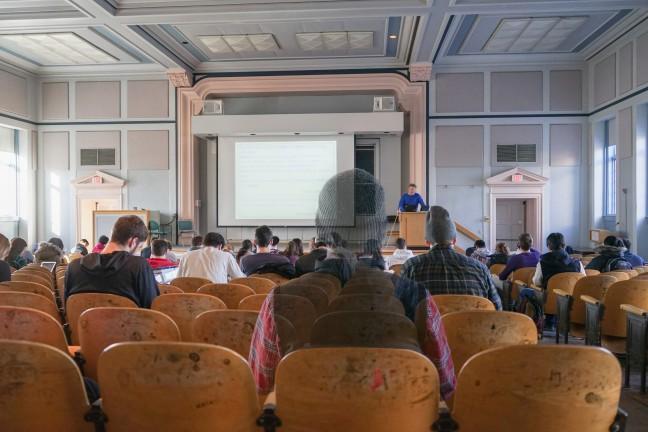As a part of the University of Wisconsin’s commitment to create a welcoming campus climate, the School of Education developed a program to train faculty on engaging in productive discussion with students and creating a more inclusive learning environment.
The new program, called “The Discussion Project,” was first revealed in the fall campus climate report by Chancellor Rebecca Blank.
Dr. Paula McAvoy, the director of The Discussion Project, said the initiative was created with the understanding that students learn better when there is a sense of community in the classroom.
“Research on classroom discussion shows that students who experience high-quality discussion feel more engaged in classes and feel more connected to their learning and to the university,” McAvoy said.
Although it is important to foster discussion, McAvoy said instructors often do not get necessary training to lead a successful conversation. Providing this training is one of the main goals in The Discussion Project, said McAvoy.
The program is particularly necessary, McAvoy said, because students miss out on important conversations if they only experience a conventional, lecture-style education.
“If students simply sit shoulder-to-shoulder in lecture halls taking notes, students miss the opportunity to learn about the experiences of others,” McAvoy said. “A classroom is also an important place to learn how to consider other points of view, build upon the ideas of others and to respectfully disagree.”
In 2016, McAvoy said the School of Education applied for funding from UW to launch the program. In January, faculty started developing the program, and with the help of a handful of graduate students and faculty members from the School of Education, the program was piloted this summer.
The Discussion Project, which was included in Blank’s campus climate report, is “part of the university’s commitment to creating a more inclusive campus,” said McAvoy.
“Chancellor Blank is highlighting The Discussion Project in the university’s current campus climate progress report because of the contribution it is making to helping UW-Madison become a more welcoming environment for all students,” said UW Communications spokeswoman Meredith McGlone.
In that report, Blank brought several other initiatives aimed at inclusivity and campus climate improvement to attention, including the “Our Wisconsin” program with the Division of Student Life and the creation of the Diversity Inventory Project, an online database of all of UW’s diversity-based programs.
Additionally, Blank highlighted the first ever campus climate survey, which was sent out to all enrolled students at UW last year.
“Becoming a more welcoming and inclusive campus requires long-term engagement in a process of self-evaluation and change,” Blank said in the report.
In conjunction with the Learning through Evaluation, Adaptation and Dissemination Center on campus, McAvoy said the School of Education will continuously evaluate the program as it progresses through the following semesters.
The Discussion Project hopes to convey to participants both the importance of discussion and efficient methods in facilitating productive conversations in a confident manner, McAvoy said.
“The main goals are to improve participants’ understanding of why discussion is important, teach them some basic principles for leading and evaluating discussion, and help them feel more confident facilitating discussion,” McAvoy said.
The Discussion Projects’s first cohort met in August of this year, signaling the official launch of the program on campus. The second cohort is set to meet at the start of the spring semester.


